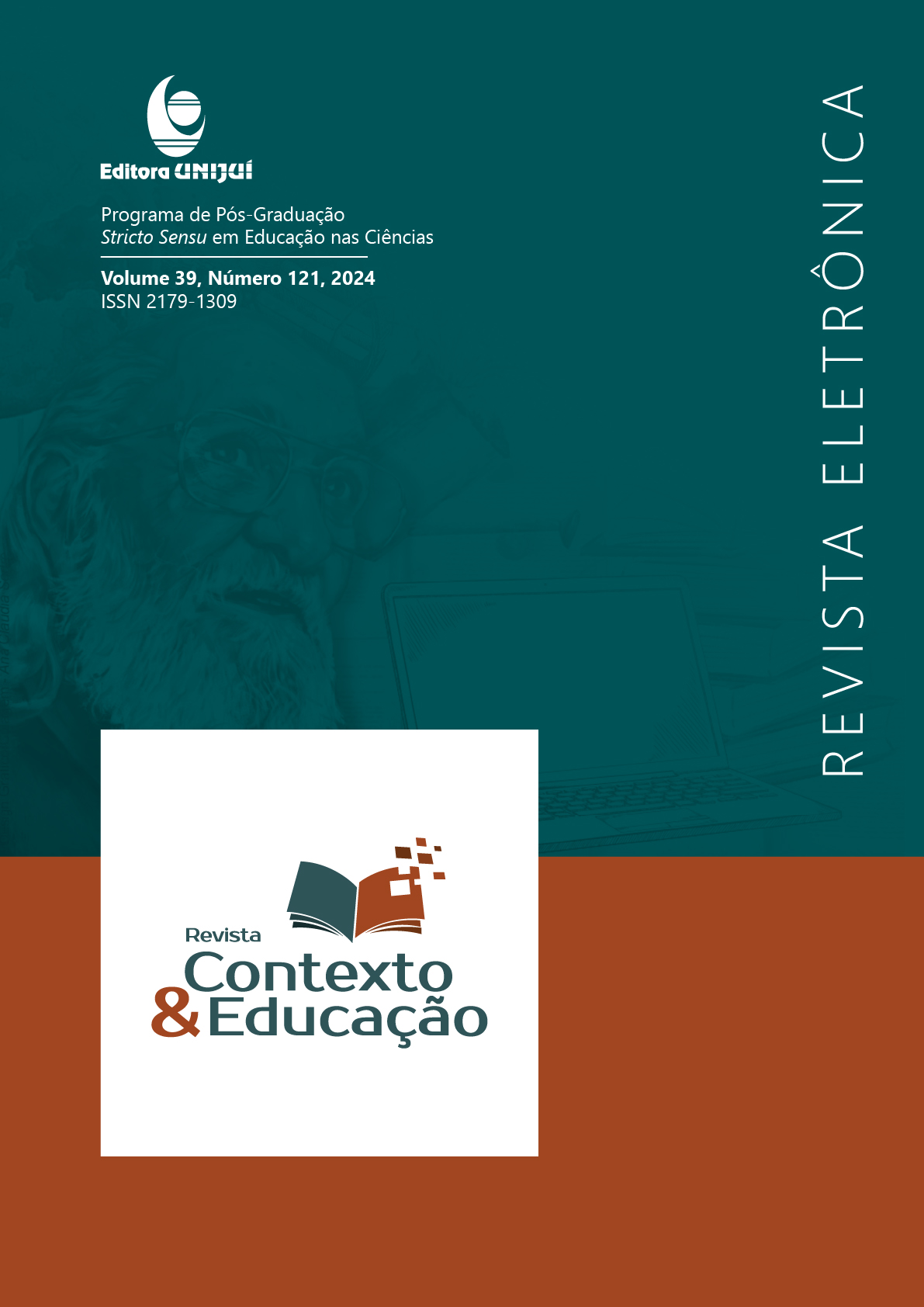Quilombolas children's cineclub: Space for participation and dialogue
DOI:
https://doi.org/10.21527/2179-1309.2024.121.14338Keywords:
Movie theater, Cineclub, quilombola childrenAbstract
Moving away from the didactic view of cinema at school, film club activities broaden the cultural repertoire, encourage reflections on the world, problematizing thinking and making cinema. During the sessions, the right of encounter and freedom of expression mediate the participation of students, here in particular, children from the Gurugi and Ipiranga quilombos in Conde-PB, participants of the Cineclub of the Municipal School of Early Childhood Education and Elementary School José Albino Pimentel. When investigating the film project developed in this unit, we question: how was the relationship of children with this artifact configured? Anchored in this questioning, we aimed to analyze the participation of quilombola children in the school Cineclub. The methodological design was structured around qualitative studies, carried out through documentary, exploratory research. To read the data, we used the content analysis technique by Laurence Bardin (2009). The findings revealed that children participated in film club activities occupying the centrality. The film club constitutes, in this experience, a space for dialogue, pleasure and promotion of authorial audiovisual production.
References
ALVES, Jaquicilene Ferreira da Silva; ARAGÃO, Patrícia Cristina de. A arte cinematográfica na educação escolar quilombola: modos de educar Gurugi e Ipiranga. Revista Discurso e Imagens Virtual em Educação. João Pessoa, v. 3, n. 2, 2018, p. 77-94.
BARDIN, Laurence. Análise do conteúdo. Trad. Luís Antero Reto e Augusto Pinheiro. Lisboa, Portugal: Edições 70 Lda, 2009.
BERGALA, Alain. A hipótese-cinema: pequeno tratado de transmissão do cinema dentro e fora da escola. Tradução: Mônica Costa Netto, Silvia Pimenta. Rio de Janeiro: Booklink - CINEAD- LISE-FE/UFRJ, 2008.
BONDÍA, Jorge Larrossa. Notas sobre a experiência e o saber da experiência. Revista Brasileira de Educação. n. 19, pp. 20-28. 2002.
DIAZ BORDENAVE, Juan Enrique. O que é participação. São Paulo, Brasiliense, 1983.
DUARTE, Rosália. Cinema & Educação: refletindo sobre cinema e educação. Belo Horizonte: Autêntica, 2002.
ECKERT, Giovana Laís; BAUMGRATZ, Cleiton Edmundo; HERMEL, Erica do Espirito Santo. Filmes, saúde e ensino de ciências: concepções dos alunos a partir do filme “Osmose Jones”. Revista Contexto & Educação, 37(117), 2022, 167–176.
FRESQUET, Adriana. Cinema e Educação: reflexões e experiências com professores e estudantes da educação básica, dentro e “fora” da escola. Autêntica editora. Belo Horizonte, 2013.
GIL. Gilberto. Íntegra do discurso do ministro Gilberto Gil (2003). Disponível em: https://www1.folha.uol.com.br/folha/brasil/ult96u44344.shtml . Acesso em: 14/12/2021.
GOUVÊA, Maria Cristina. Infância: entre a anterioridade e a alteridade. Educ. Real, Porto Alegre, v. 36, n. 2, maio/ago., 2011, p. 547-567.
GUSMÃO, Milene de Cássia Silveira; TEIXEIRA, Inês Assunção de Castro. Quando a escola abraça o Cineclube. Presença Pedagógica, Belo Horizonte, v. 18, n. 105, p. 72-78, 2012.
MARTINS, Alice Fátima. Becos e trânsitos entre escola e cinema. In: MARTINS, Raimundo; TOURINHO, Irene (Orgs.). Pedagogias Culturais. Santa Maria: Ed. Da UFSM, 2014.
MARTINS, Lígia Márcia; LAVOURA, Tiago Nicola. Materialismo histórico-dialético: contributos para a investigação em educação. Educar em Revista, Curitiba, Brasil, v. 34, n. 71, set./out., 2018, p. 223-239.
MIGLIORIN, Cezar. Inevitavelmente cinema: educação, política e mafuá. Rio de Janeiro: Beco do Azougue, 2015.
MIGLIORIN, Cezar.; PIPANO, Isaac. Cinema do Brincar. Belo Horizonte, MG: Relicário, 2019.
MINAYO, Maria Cecília. (Org.). Pesquisa Social: teoria, método e criatividade. 18. ed. Petrópolis: Vozes, 2001.
SANTOS, Eliane Gonçalves dos; ARAÚJO, Maria Cristina Pansera de; CARVALHO, Graça Simões de. Educação em saúde, mediada por filme comercial, na formação de professores de ciências da natureza. Revista Contexto & Educação, 34(109), 2019, 74–89.
TEIXEIRA, Inês Assunção de Castro. “Como um rio...”. In: RAMOS, Ana Bárbara; BARGUETE, Felipe Leal. (Org.) Cartografia de imagens: filme-carta, formação e experimentação. João Pessoa: Gráfica A União/grupo semente Cinematográfica, 2020.
TRIVIÑOS, Augusto Nibaldo Silva. Introdução à pesquisa em ciências sociais. São Paulo: Atlas, 1995.
VALLE. Lutiere Dalla. Aprendendo a ser docente através de filmes: possíveis trânsitos entre cinema e educação. In: MARTINS, Raimundo; TOURINHO, Irene (Orgs.). Pedagogias Culturais. Santa Maria: Ed. da UFSM, 2014.
Downloads
Published
How to Cite
Issue
Section
License
Copyright (c) 2024 Revista Contexto & Educação

This work is licensed under a Creative Commons Attribution 4.0 International License.
By publishing in Revista Contexto & Educação, authors agree to the following terms:
All works are published under the Creative Commons Attribution 4.0 International License (CC BY 4.0), which allows:
Sharing — to copy and redistribute the material in any medium or format;
Adaptation — to remix, transform, and build upon the material for any purpose, even commercially.
These permissions are irrevocable, provided that the following terms are respected:
Attribution — authors must be properly credited, a link to the license must be provided, and any changes made must be indicated.
No additional restrictions — no legal or technological measures may be applied that legally restrict others from doing anything the license permits.
Notices:
The license does not apply to elements that are in the public domain or covered by legal exceptions.
The license does not grant all necessary rights for specific uses (e.g., image rights, privacy, or moral rights).
The journal is not responsible for the opinions expressed in the articles, which are the sole responsibility of the authors. The Editor, with the support of the Editorial Board, reserves the right to suggest or request modifications when necessary.
Only original scientific articles presenting research results of interest that have not been previously published or simultaneously submitted to another journal with the same purpose will be accepted.
Mentions of trademarks or specific products are intended solely for identification purposes and do not imply any promotional relationship by the authors or the journal.
License Agreement (for articles published from October 2025): Authors retain the copyright to their article and grant Revista Contexto & Educação the right of first publication.


